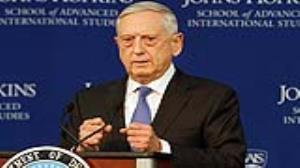It's a very complex issue. For right now, I'm focused mostly on just making certain that our military can fight, and supporting FBI and others when we spot a problem coming in from overseas. We will pick it up, and we notify the law enforcement agencies now.
But there's a lot more to be done, ladies and gentlemen, and I have not got that defined yet. Inside the military, we're good to go to; we know what we have to do. More broadly, I'm not sure yet.
MODERATOR:Thank you, Secretary Mattis.
One last question:Will a government shutdown have serious ramifications on military operations? And, if so, what are your plans for mitigation?
SEC. MATTIS:Yes. (Laughter.)
Let me give you an example. This morning or last night, young guys and gals somewhere in Wyoming were driving off to do their weekend duty. There's any number of projects we have underway that keep me at the top of my game, and our military at the top of our game, that are handled by civilians. All these things are going to be disrupted.
Those troops who arrive there at their armories, by the way, and told, "Go home," if there's a government shutdown, and they will then drive a couple hundred miles back home -- these are -- these, again, are stoic young men and women.
They'll suck it up, and they'll say, "Okay." If they're Navy reservists, they'll say, "Aye, aye, sir," cheerfully. And, when they get in their car they may not mutter something quite so positive. (Laughter.)
I would just tell you, there will be -- our maintenance activities will probably pretty much shut down. We will not be able to induct any more of our gear, our -- that need maintenance.
Over 50 percent altogether of my civilian workforce will be furloughed, and that's going to impact our contracting. It will impact, obviously, our medical facilities. It's got a huge morale impact, I'll just tell you.
How long can you keep good people around when something like this happens, is always a question that's got to hover in the back of my mind.
I would just tell you that we do a lot of intelligence operations around the world, and they cost money. Those, obviously, would stop. And I would just tell you that training for almost our entire reserve force will stop.
And you must understand the critical importance of our reserves. They're the only shock absorber we have. It's not like the old days, where you could draft somebody in and, 18 weeks later, have them in combat with the skills they need.
Today's infantrymen -- they're called infantrymen because they're infant soldiers, young soldiers -- they still take a year to train in order to have them ready to use the gear they have on them and make certain they have the ethical and tactical abilities to deal with the battlefield today.
|

